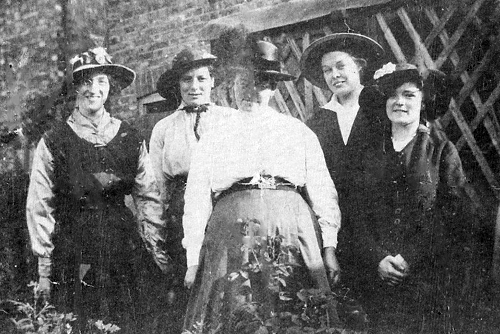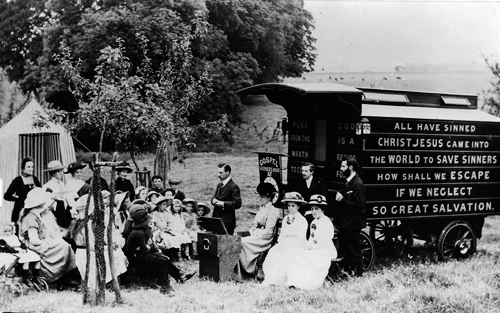Here is a 1988 interview in two parts by John Rawlins and Mike Linfield with long-term Milton resident Mabel Pearce nee Barnes.
Early Life
Mabel was born in Milton and the family moved from rented cottage to cottage in her early years, living as she says in ‘rustic’ dwellings. One in Green Lane was only held together by ivy according to Mabel (you could pick the leaves inside the bedroom). They drew water from a well in the garden, otherwise from a tap in the street.
She reminisces about the flour mill which was situated where Prew’s garage stands now. It had a mill pond which attracted children of course. She remembers a girl falling into it in the early years of the 20th century and of two men pulling her out. She remembers a solitary swan which lived on the pond for many years. She couldn’t recall when the mill closed.

First World War
At the outbreak of the First World War, Mabel was about 17 and was invited by another girl from the village to join her working at a munitions factory in Watford. (There were two National Filling Factories in Watford, one in Balmoral Road and one in Bushey Mill Lane).
Mabel’s jobs included putting gunpowder in a small unit. (For safety purposes, munitions were segregated into different compatibility groups). She also remembers how she was required to do shifts working with TNT. This was a dangerous material and workers only did occasional weekly placements. Apart from the danger of explosions, the chemical turned skin and clothes yellow!
At the end of the war, finding the munitions work heavy and detrimental to her health (she had dermatitis) she found lighter work at Waterlow’s in Watford, a company printing banknotes.
Back in Milton and Marriage
Mabel returned to Milton around 1923 living with her parents who moved to Cotswold Cottage on the corner of Frog Lane in 1928. She met her husband Alf Pearce (they married in 1932) when he came to Milton for a holiday and stayed when he was offered a job at Groves.
Alf Pearce came from the Rhondda Valley in Wales and already suffered from pneumoconiosis or miner’s lung. His brother Ted lived in Milton and his sister-in-law (Nan Pearce) taught in the village school, becoming headmistress. Oxfordshire was one of the few counties in the UK that would employ married female teachers. The Pearce family were part of the diaspora of Welsh workers in the 1920’s and 1930’s, finding employment in Oxfordshire, especially after the miners’ strikes. Mabel describes how Alf advanced at Groves, becoming a plumber.
Second World War
Mabel explains that she ‘got out’ of Second World War duties because she was full-time helping her mother look after her Aunt Carr (?). This was her mother’s cousin who was mentally ill and, not expected to live more than two years, had come to visit and stayed for 22 years!
Alf was meantime in the Home Guard, sometimes out all night driving an ambulance to Oxford, getting home at 6am and having to go to work at 7.30. Her other wartime memories include impressions of the black American soldiers billeted locally, the ARP warden Harry Walker collecting money for war savings and magic lantern shows in the Parish Rooms.
She recalls that Grove’s contract at radio stations made a lot of work for Alf during the war. She remembers also that Miss Slater the schoolteacher tried to persuade her to take evacuees, but she said she was unable to help because she was needed by her mother.
The latter stages of the first interview are an interesting “listen” – a general chat between Mabel and her two interviewers. It is so off-the-cuff that Mabel seems to forget the interview was being recorded!
Part Two of the Interview
The interview session continues in the second recording clip. Here Mabel is asked for her memories of the churches and church activities in Milton when she was growing up.
She attended Primitive Methodist gatherings. The group discussed the origins of ‘Prims’ as they were known. They were originally associated with agricultural workers, possibly starting in Northamptonshire. They came to the village in travelling caravans, often with a different lay preacher each Sunday. They gathered in the Meeting House or on the green with tents during the summer. Mabel remembers going to a camp meeting in Lyneham. The name Isaac Carson is mentioned and a commemorative tablet to him in the chapel in Milton.

Mabel also attended Sunday school at the Baptist church in Milton for a time, remembering an exciting outing by train to Moreton. She was apparently ‘kicked out’ of the Baptists (we don’t know for how long) for confessing that she had taken a sip from her father’s glass of beer.
Mabel was asked for her memories of rationing during the Second World War. She recalled the food shortages and how meat pies were distributed to families to supplement meagre meat rations. She believed they were made in Kingham. Later in the war, those doing physical labour (her husband Alf included) were given a little extra food.
CHB Oct 2023

